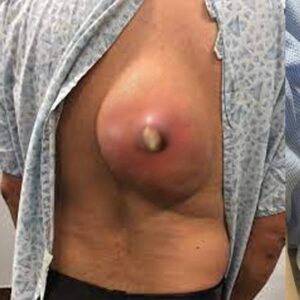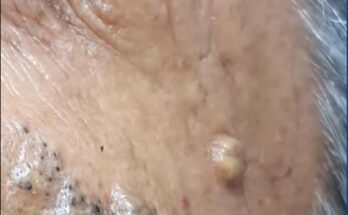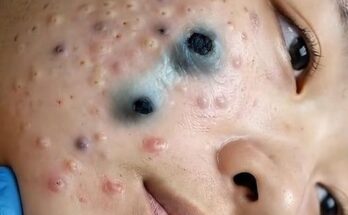Over time, these pollutants can have a surprising impact not just on our overall health but also on our skin. One of the most common effects is acne. Many people think of acne as something caused only by hormones, oily skin, or diet. While these are all valid factors, pollution plays a much larger role than most realize. The relationship between pollution and acne is becoming clearer as researchers explore how our environment interacts with the skin barrier. Understanding this connection can help us make smarter choices in daily skincare and prevention. When pollutants like dust, soot, and airborne chemicals settle on the skin, they mix with natural oils and sweat. The skin’s surface, or epidermis, is designed to protect against these invaders, but when it’s constantly under attack, its defenses weaken. The pores, which release natural oils called sebum, can become clogged with this mix of dirt and oil. Once that happens, bacteria that naturally live on the skin have the perfect environment to multiply, leading to inflammation, redness, and eventually breakouts. This process doesn’t happen overnight. People living in large cities or industrial areas may notice that their skin feels dull, congested, or easily irritated after a few days of heavy pollution exposure.
 This is the skin’s way of signaling distress. It’s working harder to stay clean and balanced but struggling to keep up with constant environmental stressors. Pollution affects acne in another indirect way too—it increases oxidative stress. This is a process where free radicals, which are unstable molecules found in polluted air, attack the skin’s healthy cells. When free radicals damage skin cells, they weaken the natural barrier that keeps moisture in and bacteria out. Over time, this can make the skin more prone to inflammation, sensitivity, and clogged pores. A compromised barrier is like a weakened shield—it leaves the skin more vulnerable to acne triggers. There’s also an interesting link between pollution and the body’s natural oil production. When the skin senses irritation or dryness caused by pollutants, it can respond by producing more sebum in an attempt to protect itself. Unfortunately, this extra oil can mix with dead skin cells and pollutants, forming the perfect recipe for acne. What starts as the body’s effort to protect itself can backfire, leading to more breakouts and clogged pores. Even people who don’t usually have oily skin can experience pollution-related acne. It’s often most noticeable in areas that are directly exposed to the environment—such as the forehead, cheeks, and jawline. For those who commute, exercise outdoors, or live in urban environments, regular cleansing and barrier protection become essential habits. But it’s not just outdoor pollution that matters. Indoor air can also play a role. Smoke from cooking, dust, pet dander, and chemical residues from cleaning products can all affect skin health. When indoor ventilation is poor, these particles linger and contribute to the same problems seen with outdoor pollutants. Spending long hours in such environments can aggravate acne or make existing breakouts harder to heal. The good news is that while pollution can contribute to acne, there are gentle ways to minimize its effects. The first step is consistent cleansing. Washing the face at the end of the day helps remove pollutants, oil, and residue before they can clog pores. However, it’s important not to overdo it. Harsh cleansers or scrubbing too hard can strip the skin’s natural moisture and cause more irritation. A mild cleanser that respects the skin’s balance works best. Another helpful approach is to support the skin’s natural barrier. Moisturizers containing antioxidants, ceramides, or gentle plant-based extracts can help the skin recover from daily exposure. These ingredients help trap moisture, repair minor damage, and shield against future pollutants. Even though acne-prone skin often fears moisturizers, skipping them can make things worse. Balanced hydration keeps oil production steady and strengthens the skin’s resilience. Sunscreen also plays a surprisingly important role in pollution protection. Many pollutants increase the skin’s sensitivity to sunlight, making it more prone to inflammation and uneven tone. A lightweight sunscreen adds another layer of defense and helps reduce the long-term effects of environmental stress. Choosing a non-comedogenic formula ensures that it won’t clog pores while providing protection. Lifestyle habits can make a difference too. Eating a diet rich in fruits, vegetables, and water helps the skin manage oxidative stress from within. Foods with natural antioxidants, such as berries and leafy greens, help neutralize free radicals and promote skin repair. Getting enough rest allows the body to regulate hormones that influence acne, while regular exercise improves circulation, helping the skin detox naturally. Of course, no single habit can eliminate pollution exposure entirely, but consistency matters. Over time, small daily actions can help skin stay clearer, calmer, and more resilient, even in challenging environments. It’s also worth remembering that everyone’s skin responds differently. Some people may find that pollution triggers frequent breakouts, while others notice only minor changes in texture or tone. Paying attention to your skin’s signals is key. If acne persists or worsens despite good care, it may help to visit a dermatologist. They can recommend gentle treatments that fit your lifestyle and environment without resorting to harsh solutions. As awareness of pollution’s effects grows, skincare research continues to evolve. Many modern products now include ingredients specifically designed to defend against environmental stressors. These innovations offer hope for those living in cities, helping to maintain clear, healthy skin even when air quality is less than ideal. In the end, the relationship between pollution and acne reminds us of how connected our environment and bodies truly are. The air we breathe, the water we use, and the spaces we inhabit all influence our skin’s condition. By understanding these connections, we can take mindful steps to protect ourselves—not just with products, but through healthy daily habits and an awareness of the world around us. Caring for your skin in a polluted world is not about perfection. It’s about balance, protection, and consistency. A clean, hydrated, and nourished complexion reflects not just good skincare, but also an understanding of how deeply our surroundings shape us. With a little attention and care, it’s possible to keep your skin glowing and resilient, even when pollution tries to stand in the way.
This is the skin’s way of signaling distress. It’s working harder to stay clean and balanced but struggling to keep up with constant environmental stressors. Pollution affects acne in another indirect way too—it increases oxidative stress. This is a process where free radicals, which are unstable molecules found in polluted air, attack the skin’s healthy cells. When free radicals damage skin cells, they weaken the natural barrier that keeps moisture in and bacteria out. Over time, this can make the skin more prone to inflammation, sensitivity, and clogged pores. A compromised barrier is like a weakened shield—it leaves the skin more vulnerable to acne triggers. There’s also an interesting link between pollution and the body’s natural oil production. When the skin senses irritation or dryness caused by pollutants, it can respond by producing more sebum in an attempt to protect itself. Unfortunately, this extra oil can mix with dead skin cells and pollutants, forming the perfect recipe for acne. What starts as the body’s effort to protect itself can backfire, leading to more breakouts and clogged pores. Even people who don’t usually have oily skin can experience pollution-related acne. It’s often most noticeable in areas that are directly exposed to the environment—such as the forehead, cheeks, and jawline. For those who commute, exercise outdoors, or live in urban environments, regular cleansing and barrier protection become essential habits. But it’s not just outdoor pollution that matters. Indoor air can also play a role. Smoke from cooking, dust, pet dander, and chemical residues from cleaning products can all affect skin health. When indoor ventilation is poor, these particles linger and contribute to the same problems seen with outdoor pollutants. Spending long hours in such environments can aggravate acne or make existing breakouts harder to heal. The good news is that while pollution can contribute to acne, there are gentle ways to minimize its effects. The first step is consistent cleansing. Washing the face at the end of the day helps remove pollutants, oil, and residue before they can clog pores. However, it’s important not to overdo it. Harsh cleansers or scrubbing too hard can strip the skin’s natural moisture and cause more irritation. A mild cleanser that respects the skin’s balance works best. Another helpful approach is to support the skin’s natural barrier. Moisturizers containing antioxidants, ceramides, or gentle plant-based extracts can help the skin recover from daily exposure. These ingredients help trap moisture, repair minor damage, and shield against future pollutants. Even though acne-prone skin often fears moisturizers, skipping them can make things worse. Balanced hydration keeps oil production steady and strengthens the skin’s resilience. Sunscreen also plays a surprisingly important role in pollution protection. Many pollutants increase the skin’s sensitivity to sunlight, making it more prone to inflammation and uneven tone. A lightweight sunscreen adds another layer of defense and helps reduce the long-term effects of environmental stress. Choosing a non-comedogenic formula ensures that it won’t clog pores while providing protection. Lifestyle habits can make a difference too. Eating a diet rich in fruits, vegetables, and water helps the skin manage oxidative stress from within. Foods with natural antioxidants, such as berries and leafy greens, help neutralize free radicals and promote skin repair. Getting enough rest allows the body to regulate hormones that influence acne, while regular exercise improves circulation, helping the skin detox naturally. Of course, no single habit can eliminate pollution exposure entirely, but consistency matters. Over time, small daily actions can help skin stay clearer, calmer, and more resilient, even in challenging environments. It’s also worth remembering that everyone’s skin responds differently. Some people may find that pollution triggers frequent breakouts, while others notice only minor changes in texture or tone. Paying attention to your skin’s signals is key. If acne persists or worsens despite good care, it may help to visit a dermatologist. They can recommend gentle treatments that fit your lifestyle and environment without resorting to harsh solutions. As awareness of pollution’s effects grows, skincare research continues to evolve. Many modern products now include ingredients specifically designed to defend against environmental stressors. These innovations offer hope for those living in cities, helping to maintain clear, healthy skin even when air quality is less than ideal. In the end, the relationship between pollution and acne reminds us of how connected our environment and bodies truly are. The air we breathe, the water we use, and the spaces we inhabit all influence our skin’s condition. By understanding these connections, we can take mindful steps to protect ourselves—not just with products, but through healthy daily habits and an awareness of the world around us. Caring for your skin in a polluted world is not about perfection. It’s about balance, protection, and consistency. A clean, hydrated, and nourished complexion reflects not just good skincare, but also an understanding of how deeply our surroundings shape us. With a little attention and care, it’s possible to keep your skin glowing and resilient, even when pollution tries to stand in the way.


